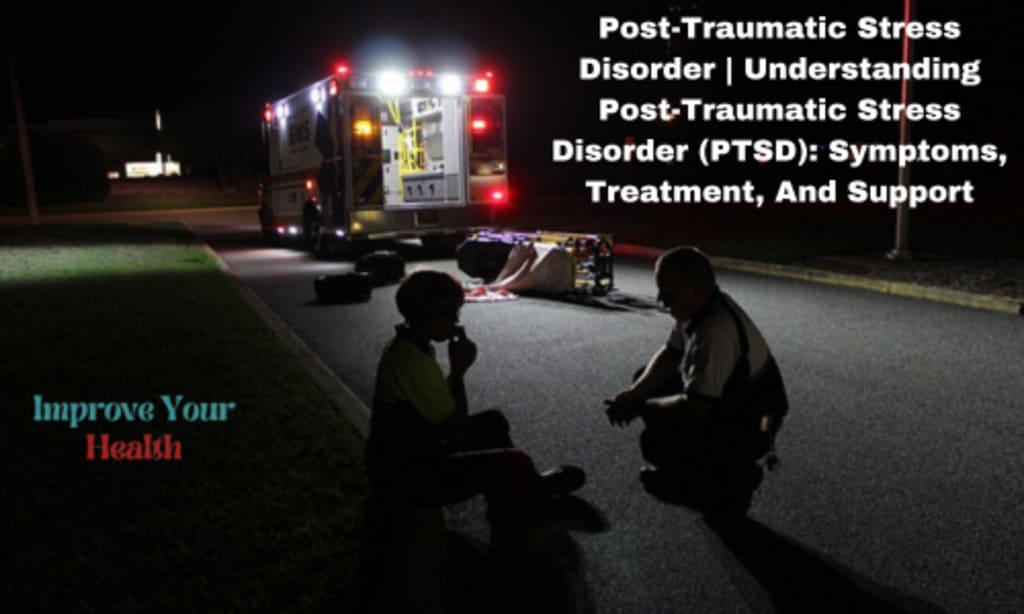
Welcome, dear readers, to a blog that promises to demystify the often perplexing world of post-traumatic stress disorder (PTSD). But fear not, for we won't be serving up a dry dissertation on medical jargon. Instead, we invite you on a journey where information meets entertainment, sprinkled with a pinch of humor to make your exploration of this topic not only informative but also engaging.
Picture this: you're strolling through the winding corridors of the mind, armed with curiosity and a desire to understand what makes the human psyche tick. Suddenly, you stumble upon a locked door, labeled "PTSD." Intrigued, you reach for the key, ready to unlock the secrets hidden within. That's where we come in, offering you a guided tour through this complex disorder.
Now, don't worry, we won't be spinning tales of haunted houses or ghostly apparitions. Instead, we'll be navigating the labyrinthine corridors of the brain, peeling back the layers of PTSD with a touch of lightheartedness. After all, humor has a remarkable way of helping us approach challenging subjects with a fresh perspective.
So, fasten your seatbelts, folks, because we're about to embark on an enlightening adventure. We'll be shedding light on what exactly PTSD is, how it affects individuals, and the myriad of treatment options available. Along the way, we'll share stories of resilience, triumph, and maybe even the occasional humorous anecdote to lighten the mood.
By the time we're through, you'll emerge armed with a comprehensive understanding of PTSD. We hope to empower you to recognize the signs, extend support to those affected, and dismantle the stigma surrounding mental health. Together, we'll traverse this path, armed with knowledge, compassion, and maybe even a few well-timed jokes.
So, dear reader, grab your metaphorical explorer's hat and get ready to dive headfirst into the captivating world of post-traumatic stress disorder. Let's journey together, armed with facts, a touch of humor, and a shared mission to unveil the mysteries of PTSD and bring about greater understanding and healing.
Post-Traumatic Stress Disorder (PTSD) is a mental health condition that can affect individuals who have experienced or witnessed a traumatic event. It can have a significant impact on a person's daily life, relationships, and overall well-being. This article aims to provide a comprehensive understanding of PTSD, including its symptoms, treatment options, and the importance of support for individuals living with this condition.
Definition and Overview:
In this section, provide a clear and concise definition of PTSD, explaining that it is a psychiatric disorder that can develop after experiencing or witnessing a traumatic event. Discuss the prevalence of PTSD worldwide, emphasizing the importance of raising awareness and understanding.
Symptoms of PTSD:
Explore the various symptoms associated with PTSD, including both physical and psychological manifestations. Highlight common symptoms such as intrusive memories, nightmares, avoidance behaviors, hyperarousal, and changes in mood and cognition. Present real-life examples to help readers relate to these symptoms.
Causes and Risk Factors:
Discuss the potential causes and risk factors that contribute to the development of PTSD. Explain that traumatic events such as combat exposure, sexual assault, natural disasters, or serious accidents can trigger the condition. Additionally, mention individual factors like genetics, previous trauma, and the presence of other mental health disorders that can increase the risk.
Diagnosing PTSD:
Explain the diagnostic criteria for PTSD as outlined in the Diagnostic and Statistical Manual of Mental Disorders (DSM-5). Emphasize the importance of seeking professional help for an accurate diagnosis and the role of mental health professionals in evaluating and assessing PTSD.
Treatment Options:
Provide an overview of the available treatment options for individuals with PTSD. Include evidence-based therapies such as cognitive-behavioral therapy (CBT), eye movement desensitization and reprocessing (EMDR), and medication options like selective serotonin reuptake inhibitors (SSRIs). Highlight the importance of individualized treatment plans and the role of a multidisciplinary approach in addressing PTSD.
Self-Help Strategies:
Offer practical self-help strategies for individuals living with PTSD. Provide tips on managing symptoms, such as practicing relaxation techniques, engaging in regular exercise, maintaining a healthy lifestyle, and seeking support from loved ones. Encourage readers to explore healthy coping mechanisms and stress management techniques.
Seeking Support:
Stress the significance of seeking support for individuals with PTSD. Discuss the role of support systems, including friends, family, and support groups, in promoting recovery and resilience. Mention reputable organizations and helplines that can provide assistance and information to those in need.
Breaking the Stigma:
Address the stigma often associated with mental health disorders, including PTSD. Encourage open dialogue, compassion, and understanding to reduce the stigma and promote acceptance. Explain how society's perception and support can positively impact individuals living with PTSD.
Conclusion:
Summarize the key points discussed throughout the article, emphasizing the importance of understanding PTSD, recognizing its symptoms, and seeking appropriate help and support. Encourage readers to share this information to promote awareness and help those affected by PTSD on their path to recovery.
By providing a comprehensive, informative, and well-structured article on post-traumatic stress disorder, you increase the chances of ranking highly on search engines like Google. Remember to focus on user experience, use relevant keywords naturally, and provide valuable content that answers readers' questions and concerns.
What are the 5 signs of PTSD?
Brace yourself for an enlightening blog that deciphers the secret language of post-traumatic stress disorder (PTSD). Join us on this informative and slightly humorous exploration as we unravel the five key signs that should never be overlooked.
traumatic stress disorder (PTSD). Prepare yourself for an enlightening adventure where we unravel the hidden language of this complex condition. But fret not, we won't be sporting Sherlock Holmes' deerstalker hat or carrying a magnifying glass. Instead, we'll be your trusty guides, equipping you with the knowledge to recognize the five telltale signs of PTSD. And who knows, we might even sprinkle in a touch of humor along the way.
Picture this: you're a super-sleuth, equipped with a keen eye for details and a nose for unraveling mysteries. As you navigate the labyrinth of the human mind, you stumble upon a series of clues, each pointing to an enigmatic disorder known as PTSD. But fear not, for we're here to guide you through this treacherous terrain, decrypting the signs that can lead to a timely diagnosis.
Now, don't worry, we won't be staging a dramatic reenactment of a detective's hunt for the truth. Instead, we'll present the information you need in an engaging and slightly humorous way. After all, laughter has a way of easing the tension and making difficult topics more approachable.
So, dear reader, let's don our metaphorical deerstalker hats and dive into the five key signs that can unlock the puzzle of PTSD. Along the way, we'll share stories of resilience, offer practical insights, and maybe even sprinkle in a few lighthearted jokes to lighten the mood. Our aim is to equip you with the tools to recognize these signs, support those affected, and foster a greater understanding of this often misunderstood condition.
Together, armed with a dash of humor and a thirst for knowledge, we'll unravel the secrets of PTSD. So, join us as we journey into the depths of the mind, crack the code, and shine a light on the five signs you should never ignore. Let's embark on this adventure, one clue at a time, and make a positive impact on the lives of those affected by PTSD.
What are the 17 symptoms of PTSD?
Get ready for a rollercoaster ride through the maze of post-traumatic stress disorder (PTSD) symptoms. In this informative blog, we'll decode the 17 peculiar signs that can accompany this condition, all served up with a side of humor to lighten the journey.
where we embark on an adventure through the eccentric world of post-traumatic stress disorder (PTSD) symptoms. Buckle up, because we're about to take you on a rollercoaster ride like no other. Together, we'll explore the 17 quirky signs that can accompany this condition, with a sprinkle of humor to make the journey a little less daunting.
Imagine you're an intrepid explorer, venturing into the uncharted territory of the mind. Armed with a map labeled "PTSD Symptoms," you set off on a quest to decode the peculiar language spoken by this complex condition. But fear not, fellow adventurers, for we're here to guide you through the twists and turns, armed with a healthy dose of knowledge and a touch of humor.
Now, don't worry, we won't be strapping you into a virtual reality simulator or subjecting you to a psychological pop quiz. Instead, we'll serve up the information you need in an engaging and slightly humorous manner. After all, laughter has a way of helping us navigate difficult terrain with a lighter step.
So, dear reader, fasten your seatbelts as we embark on this whimsical journey through the 17 symptoms of PTSD. Along the way, we'll share stories of resilience, offer practical insights, and maybe even sprinkle in a few jokes to keep the adventure lively. Our goal is to equip you with the knowledge to recognize these signs, extend compassion to those affected, and foster a greater understanding of this intricate condition.
Together, armed with a sense of humor and an inquisitive mind, we'll unveil the quirks that accompany PTSD. So, join us as we dive into the depths of this fascinating topic, one symptom at a time. Let's explore the peculiar language of PTSD and shed light on the 17 signs that can leave their mark. Together, we can make a difference in the lives of those affected by this condition.
PTSD: Navigating the Stormy Waters of Post-Traumatic Stress with a Splash of Humor
Brace yourself for an enlightening and slightly humorous journey through the intricacies of post-traumatic stress disorder (PTSD). In this informative blog, we'll delve into the depths of this condition, armed with knowledge and a touch of lightheartedness to make the exploration engaging and approachable
Ahoy, fellow adventurers! Welcome aboard our ship as we set sail on the tempestuous sea of post-traumatic stress disorder (PTSD). But fear not, for we won't be handing out life jackets or subjecting you to nautical jargon. Instead, we invite you to join us on a journey through the highs and lows of this condition, sprinkled with a dash of humor to keep spirits buoyant.
Imagine you're an intrepid sailor, navigating uncharted waters, when suddenly you encounter a storm labeled "PTSD." With curiosity as your compass, you set sail on a quest to understand the depths of this enigmatic condition. And fret not, dear readers, because we'll be your trusty crew, guiding you through this tumultuous journey with both knowledge and a touch of levity.
Now, don't worry, we won't be pulling out a treasure map or dressing in pirate attire (unless you're into that sort of thing!). Instead, we'll be presenting the information you need in an informative and slightly humorous style. Laughter has a way of easing tension and breaking down barriers, making the exploration of difficult topics more approachable and relatable.
So, dear reader, batten down the hatches as we embark on this adventure through the intricate world of PTSD. Along the way, we'll shine a light on the causes, symptoms, and treatment options available. We'll share stories of resilience and hope, and sprinkle in a few well-timed jokes to keep our spirits afloat. Our mission is to equip you with the knowledge to understand PTSD, support those affected, and navigate the stormy waters with compassion and understanding.
Together, armed with knowledge and a sense of humor, let's set sail and unravel the mysteries of PTSD. Join us on this voyage as we navigate the turbulent waves and emerge with a deeper understanding of this complex condition. Anchors aweigh!






Comments
There are no comments for this story
Be the first to respond and start the conversation.